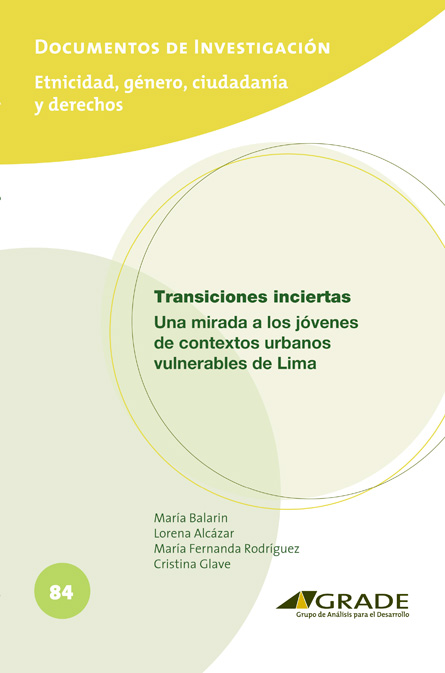Transiciones inciertas: una mirada a los jóvenes de contextos urbanos vulnerables de Lima
| Year | : | 2017 |
|---|---|---|
| Author/s | : | Maria Balarin, Lorena Alcazar, María Fernanda Rodríguez, Cristina Glave |
| Area/s | : | Ethnicity, gender and citizenship |
Balarin, M., Alcázar, L., Rodríguez, M. F. y Glave, C. (2017). Transiciones inciertas: una mirada a los jóvenes de contextos urbanos vulnerables de Lima (Documentos de Investigación N° 84). Lima: GRADE.
In line with the literature that conceives of youth as a transition process that takes place in a particular economic, social and political context that shapes differentiated trajectories, this study analyses the main barriers and opportunities that young Peruvians from vulnerable urban contexts encounter in their transition to adulthood.
Through participatory work with young people in the districts of San Juan de Lurigancho and Ventanilla, interviews with representatives of local institutions and the review of databases, it is found that although there are common factors that affect the transition to adulthood of this population —such as the lack of economic resources that influences their ability to access educational credentials and, with it, quality jobs— it is found that although there are common factors that affect the transition to adulthood of this population – such as the lack of economic resources that influences their ability to access educational credentials and, This process is also influenced by other elements —such as the particularities and degree of precariousness of the local context, social capital and family characteristics— which lead to different trajectories, some more favourable than others. Likewise, a series of gender-differentiated factors —such as the domestic and care burden in the case of women and the economic burden in the case of men— are found to play an important role in shaping the life trajectories of these young people.
Based on these findings, the study reflects on public policies as determinants in facilitating the transition to adulthood in contexts of precariousness. Although there are currently relevant policies for Peruvian youth, there is also a marked absence of the state in marginalised urban spaces.







